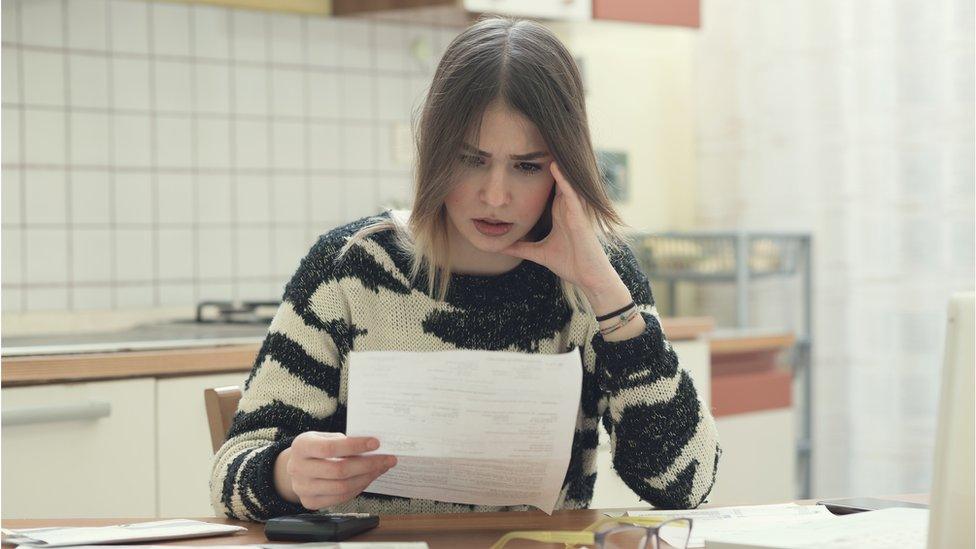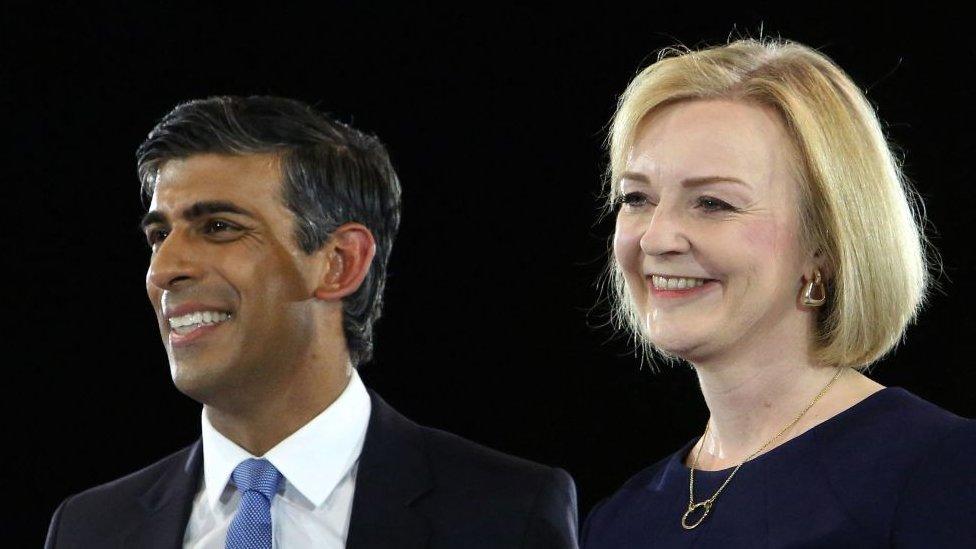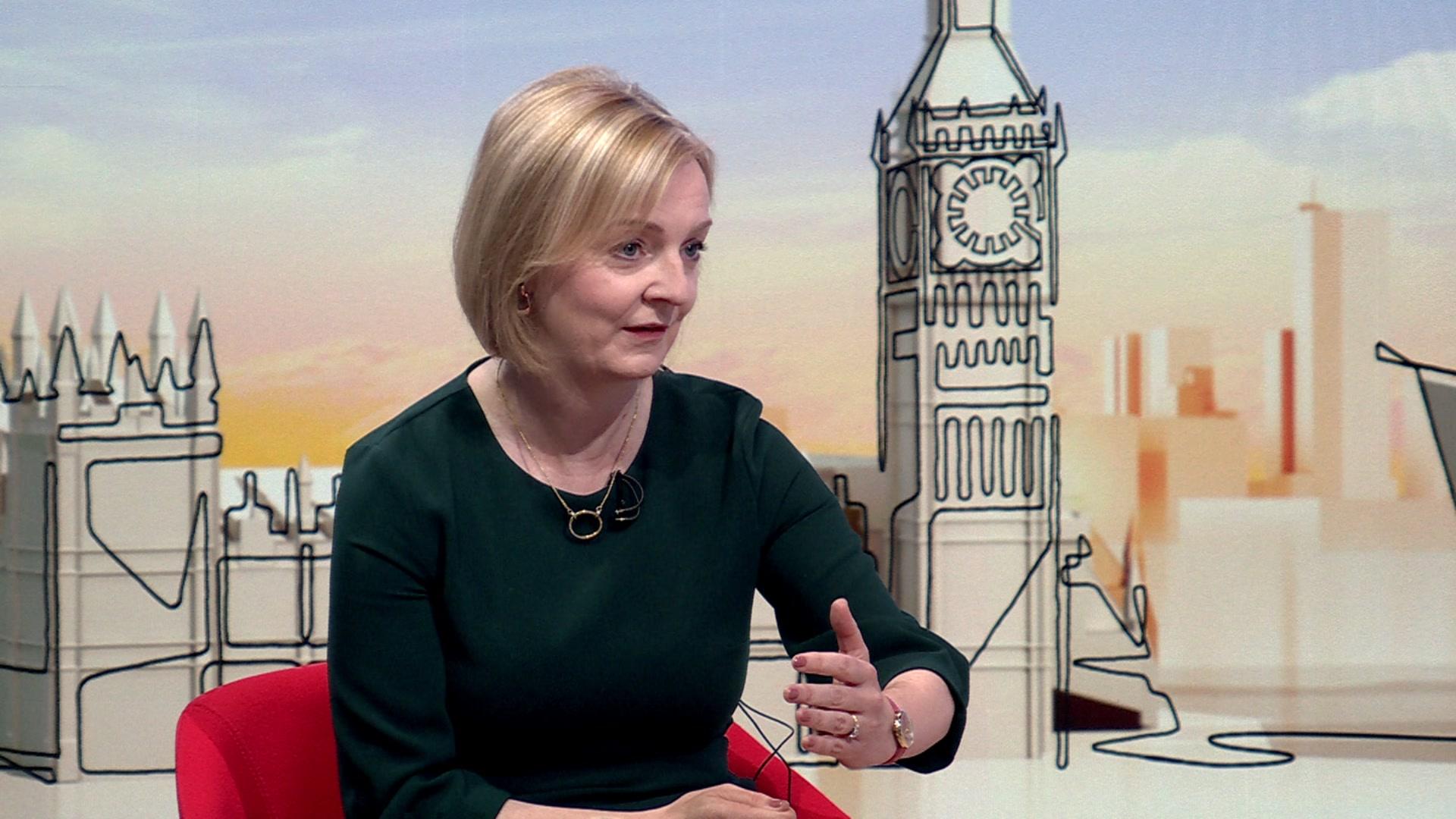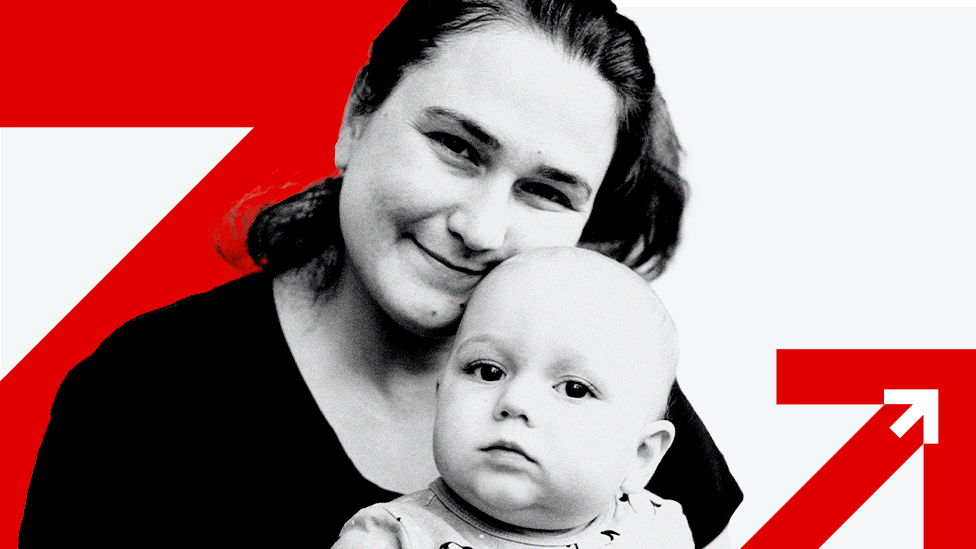New Prime Minister Liz Truss expected to freeze energy bills
- Published
- comments

New Prime Minister Liz Truss used her victory speech to pledge to "deliver on the energy crisis" by dealing with bills as well as supplies.
A freeze on energy bills is understood to be one of a number of options being worked on to help struggling households to cope with soaring costs.
It is expected that energy suppliers will be able to take out government-backed loans to subsidise bills.
Energy bosses have been meeting with government officials on the matter.
A £100bn plan to freeze household bills was proposed by energy companies last month.
Under the proposal, bills would be subsidised and the current price cap of £1,971 for a typical family would be maintained for two years.
The BBC understands that a similar scheme will be used to limit the energy price increases being experienced by small and medium-sized businesses.
And bigger companies may be offered tax breaks to help them through the period of high prices.
'Bold action'
Ms Truss beat rival Rishi Sunak with 57% of party member votes to become the new Conservative leader.
Speaking after the announcement, she said: "I will deliver on the energy crisis, dealing with people's energy bills but also dealing with the long-term issues we have on energy supply."
In response, Labour leader Sir Keir Starmer said: "There can be no justification for not freezing energy prices.
"There's a political consensus that needs to happen. She needs to ask the question, how she's going to pay for that? Labour made it clear, it needs to be a windfall tax on oil and gas companies."
Ms Truss's team is understood to have been working on a support package for energy bills "for weeks". An announcement on what they will do is pencilled in for this Thursday.
"Lots of measures have been considered, some have progressed and some have not," a source told the BBC.
Business groups welcomed Ms Truss's appointment but urged her to take "big bold action" to help firms who, unlike households, are not protected by an energy price cap.
Federation of Small Businesses chairman Martin McTague said soaring energy bills "must be addressed urgently."
And Tony Danker, the director general of the Confederation of British Industry, said he was "hopeful" that businesses would receive help.
"The cliff edge that's coming on new energy contracts [for businesses] are astronomical, and need smoothing," he told the BBC.
"I'm pretty hopeful this week that not only will the new prime minister tackle energy bills for households, she'll also look at businesses too."
'Difficult times'
A freeze of the energy price cap - the limit on how much gas and electricity can cost in England, Scotland and Wales - would not necessarily require upfront government funding.
In an article for the Financial Times, external, Ms Truss' close ally Business Secretary Kwasi Kwarteng said a government led by her would borrow more to help people through "exceptionally difficult times" during the energy price shock.
Mr Kwarteng - tipped to be named chancellor by Ms Truss - suggested he would look at the UK's rules on government borrowing and spending - called fiscal rules - to see if they still worked for the economy.
The Treasury is allowed to suspend its fiscal rules in the event of a "significant negative shock to the UK economy".
However, Mr Kwarteng sought to reassure markets that the UK had space to borrow more and that it would be done in a "fiscally responsible way".
During the leadership race, Ms Truss said she would reverse a 1.25% rise in National Insurance and would suspend an increase in corporation tax - the measures will cost a combined £30bn.
The Institute for Fiscal Studies (IFS) said the National Insurance cut would be of greater benefit to higher earners rather than those on lower income.
During an interview with the BBC's Sunday with Laura Kuenssberg, Ms Truss said it was fair to give higher earners more money back through tax cuts. and recent Tory policy had failed to grow the economy.


A plan to freeze energy bills for households is striking in its simplicity for those facing a tough winter - until you start considering how it can be funded, and other details.
It is likely to ultimately cost billions of pounds, and that may need to be paid back either through you paying extra on bills for the next decade, or through taxation if the government picks up the tab, or through extra borrowing.
They would seem to be main options, given Liz Truss has been clear that she is not keen on a windfall tax on energy companies' profits.
And, remember, the price cap only covers domestic bills in England, Wales, and Scotland. Will there be anything similar for billpayers in Northern Ireland who have also seen the cost of heating and lighting homes rise? What about small businesses, who are also seeing bills surge?
We should not expect answers yet. We should wait for a policy announcement first.

Paul Johnson, director of the IFS, said "simply cutting taxes, cutting National Insurance contributions for example, is not a strategy for growth".
He told BBC Radio 4's Today programme these measures would come on top of the billions the government would have to spend to help with energy bills.
"We'll have not just extremely high borrowing in the short run but also additional inflationary pressure," he said.
Last month, Labour said the government should freeze household energy bills, outlining a £29bn plan that would stop the energy price cap going up for all homes.
At the time, Ms Truss dismissed the proposal as a "sticking plaster".

Liz Truss beat Rishi Sunak in the Tory leadership contest
The Lib Dems have called for a price cap rise in October - which will take the typical household energy bill from £1,971 to £3,549 - to be scrapped. It proposed that the cost be covered by a windfall tax on energy company profits.
Ms Truss did not rule out a freeze during her Sunday interview with Laura Kuenssberg, but there is still a lack of clarity about how it could be funded.
Derek Lickorish, chairman of pay-as-you-go energy supplier Utilita, said he and other industry bosses had been calling for a freeze to the energy price cap "for some time".
"We recognise it's going to be very expensive but if we don't the economy is going to crash and consumers won't know what to do, they won't know where to turn to for help," he told the BBC's Today programme.
Related topics
- Published4 September 2022

- Published15 February 2024
